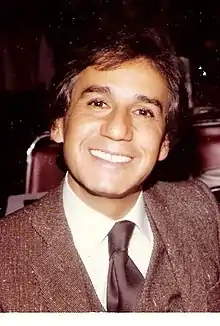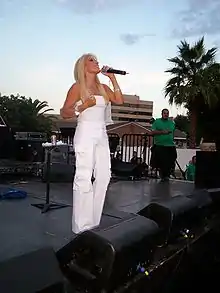Mexico in the OTI Festival
Mexico and its member station Televisa, participated in the OTI festival 26 times making its debut in 1973, one year after the start of the contest. During the contest’s run, Mexico was one of the most successful nations with a record six wins, including a back-to-back victory in 1989 and 1990, and 14 top 3 finishes.
| Mexico | |
|---|---|

| |
| Participating broadcaster | Televisa |
| Participation summary | |
| Appearances | 26 |
| First appearance | 1973 |
| Highest placement | 1st: 1973, 1975, 1985, 1989, 1990, 1997 |
| External links | |
| Televisa page | |
History
Mexico was along with Spain the most successful country of the history of the festival with six victories. Apart from the victories, the country ended in the top 10 on 19 occasions.[1]
The first Mexican victory came in 1973 in Belo Horizonte with Imelda Miller who sung the song "¡Que alegre va María!" (How happy goes Mary!!).[2] Two year later, the country won again the contest in San Juan with the song "La felicidad" (The happiness) sung by Gualberto Castro.[3] One decade later, México won again the contest with the folk singer Eugenia León, who sung "El fandango aquí" (The fandango is here) in a very controversial victory, which was attributed to the solidarity with the country because of the 1985 Mexico City earthquake, that destroyed the capital city.[4]
In 1989 and 1990 Mexico got two consecutive wins with the singer "Analí" and "Carlos Cuevas". The last Mexican victory came in 1997 in Lima, Perú with the song "Se diga lo que se diga" (Whatever it's said).
Mexico hosted the OTI festival 6 times, the first one in the Ruiz de Alarcón theatre of Acapulco. In 1981 and 1984 the festival was held in the national capital, being the gigantic National Auditorium the venue. In 1991, Acapulco hosted again the festival in the Convention Centre of the tourist city, the same venue where the last edition of the contest was held.
National final

The Mexican OTI Song Contest trajectory is known for its popular national final, the "National OTI Contest", which was passionately followed every year by the Mexican audience and known by its surprises and frequent scandals. This selection process is usually compared with its Swedish Eurovision counterpart, the Melodifestivalen due to the interest that it created and the big names who tried to represent México in the main OTI Festival.[5]
Contestants


- Table key
| Year | Artist | Title | Final | Points |
|---|---|---|---|---|
| 2000 | Natalia Sosa | Mi vida (My life) | 3 | _ |
| 1998 | Fernando Ibarra | Voy a volverme loco (I'm going to go crazy) | _ | _ |
| 1997 | Iridián | Se diga lo que se diga (Whatever it's said) | 1 | _ |
| 1996 | Sergio Arzate | Del piso a la nube (From the ground to the cloud) | _ | _ |
| 1995 | Sayeg | Cantos distintos (Different songs) | _ | _ |
| 1994 | Fuga de Goya | Rompe el cristal (Break the crystal) | 5 | _ |
| 1993 | Magdalena Zárate | Siempre a medias (Always interrupted) | 2 | _ |
| 1992 | Arturo Vargas | Enamorado de la vida (In love with life) | _ | _ |
| 1991 | Rodolfo Muñiz | Barrio viejo (Old town) | 3 | _ |
| 1990 | Carlos Cuevas | Un bolero (A love song) | 1 | _ |
| 1989 | Analí | Una canción no es suficiente (One song is not enough) | 1 | _ |
| 1988 | María del Sol | Contigo y con el mundo (With you and with the world) | 5 | _ |
| 1987 | Ana Gabriel | ¡Ay amor! (Oh my love!!) | 3 | _ |
| 1986 | Prisma | De color rosa (Pink colored) | 2 | _ |
| 1985 | Eugenia León | El fandango aquí (The fandango is here) | 1 | _ |
| 1984 | Yuri | Tiempos mejores (Better times) | 3 | _ |
| 1983 | María Medina | Compás de espera (Wait rhythm) | 10 | 12 |
| 1982 | Enrique Guzmán | Con y por amor (With and for love) | 4 | 22 |
| 1981 | Yoshio | Lo que pasó pasó... (What happened just happened...) | 3 | 22 |
| 1980 | José Roberto | Sólo te amo a ti (You are the only one that I love) | 8 | 21 |
| 1979 | Estela Núñez | Vivir sin ti (To live without you) | 8 | 18 |
| 1978 | Lupita D'Alessio | Como tú (Just like you) | 3 | 44 |
| 1977 | José María Napoleón | Hombre (Man) | 16 | 0 |
| 1976 | Gilberto Valenzuela | De que te quiero te quiero (I love you because I love you) | 4 | 8 |
| 1975 | Gualberto Castro | La felicidad (The happiness) | 1 | 20 |
| 1974 | Enrique Cáceres | Quijote | 9 | 3 |
| 1973 | Imelda Miller | ¡Que alegre va María! (How happy goes María!!) | 1 | 17 |
| 1972 | Did not participate | |||
References
- "¿Qué fue de ellos? Mexicanos ganadores del Festival OTI | De10". de10.com.mx (in Spanish). 2014-11-29. Retrieved 2017-04-05.
- D.F.-, NOTIMEX/ MÉXICO. "Rinden homenaja a Imelda Miller por 54 años de carrera" (in Mexican Spanish). Retrieved 2017-04-05.
- "Una voz sin tiempo: Gualberto Castro, figura indiscutible de México - Retos por México". Retos por México (in European Spanish). 2017-03-17. Retrieved 2017-04-05.
- "La representante de México, Eugenia León, ganadora del XVI Festival de la OTI". EL PAÍS (in Spanish). 1985-09-23. Retrieved 2017-04-05.
- "La OTI: OTI MEXICO". La OTI. Retrieved 2017-12-20.